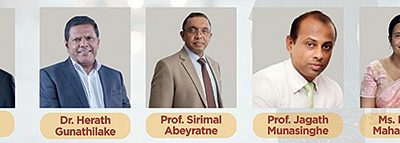Editorial
Where are workers?

Wednesday 1st May, 2024
Another International Workers’ Day has dawned. Grand preparations have been made in this country to celebrate it amidst an unprecedented economic crisis. These celebrations, however, have little or nothing to do with workers; they have apparently everything to do with political parties and their leaders. The next presidential election is only a few months away, and therefore we will see a lot of political muscle flexing today, with the prospective candidates bringing as many supporters as possible to Colombo from all parts of the country to attract media attention.
Given the despicable manner in which Sri Lankan politicians use workers to gain political mileage on the pretext of championing the rights of the working class, one wonders whether Sri Lanka should have a separate workers’ day on 21 March, when the World Puppetry Day falls. We hold workers in high esteem and intend no affront to them, but it needs to be said that the spectacle we behold on 01 May, year in year out, is a grand puppet show. Worryingly, workers do not care to assert themselves at least on May Day, much less eclipse politicians. They are not ashamed of making a public display of their servility to their political masters.
All political parties that stand accused of having suppressed labour rights have trade union wings, which have workers on a string. The UNP ruthlessly crushed a general strike in 1980. It resorted to mass sackings, and about 50,000 strikers were terminated overnight for demanding a pay hike. Dozens of those unfortunate men and women took their own lives. It is also celebrating the International Labour Day, with its trade unionists carrying its leaders on the shoulders and singing hosannas. The SLPP, whose leaders have the blood of workers on their hands and bankrupted the economy, causing many job losses, and reducing millions of people to penury, is also celebrating the International Workers’ Day! The same goes for the SLFP, which left the 1980 strikers in the lurch after they lost their jobs, and became part of the incumbent dispensation. The JVP, which murdered many trade union leaders and workers for opposing its terror campaign in the late 1980s, now claims to be the greatest protector of workers’ rights. It unflinchingly betrayed workers in 1980 by pulling out of that year’s general strike at the eleventh hour; in doing so, it demoralised the protesting workers beyond measure and emboldened the J. R. Jayewardene government to crush the strike. It is also celebrating the International Workers’ Day today. Time was when the traditional left was at the forefront of struggles to win workers’ rights, but unfortunately it has been in the SLFP-led governments responsible for gross violations of labour rights.
It may not be fair to say workers have not gained anything, at all, under successive governments. There are some progressive labour laws and workers’ welfare schemes. But workers would not have been in the current predicament if those governments had worked with their interests at heart. Workers are struggling for survival because all governments since 1977 have aggravated the country’s debt burden, which led to the current crisis precipitated by the Gotabaya Rajapaksa government.
Trade unions in Sri Lanka have earned notoriety for overstepping their limits, and some of their leaders have strayed into active politics at the expense of their members’ interests. Several trade unions were among those who misled President Gotabaya Rajapaksa and contributed to the ruination of the economy. It was at their behest that he plunged head first into a disastrous experiment with organic farming.
It is time Sri Lankan workers, especially their trade union leaders, abandoned the practice of helping further the interests of politicians on May Day, and realised the need to liberate themselves from the clutches of political parties. Let that be their May Day resolution.
Editorial
Listen to workers

Friday 30th January, 2026
Time was when governments inveighed against the JVP for instigating strikes in vital sectors to further its political interests. Today, a JVP-led government is accusing its political rivals of manipulating trade unions to advance their political agendas on the pretext of championing workers’ rights. Following the 2024 regime change, it was widely thought that the country would at last be free from strikes as the JVP, the main instigator of strikes, had gained state power. During the initial phase of the JVP-NPP rule, all was quiet on the trade union front, but labour disputes began to manifest themselves thereafter.
Development Officers (DOs), attached to the state-run schools, have been protesting near the Presidential Secretariat, Colombo, for four days, demanding that they be absorbed into the teacher service without being made to sit a competitive examination. Some of them were on a hunger strike at the time of writing, claiming that the government had denied them an opportunity to be heard.
The NPP administration is thought to be in a straitjacket where state sector recruitment is concerned. It has to curtail government expenditure in keeping with the IMF bailout conditions. But pressure is mounting on it to fulfil its pledges to the unemployed graduates and the DOs, who campaigned hard for the JVP/NPP in the 2024 presidential and parliamentary elections. In 2024, a few weeks after forming a government, the NPP had a DOs’ protest near the Education Ministry in Battaramulla dispersed by the police!
The state service, bursting at the seams, has become a main source of employment for ruling party supporters over the past several decades. Sri Lanka currently has about 1.5 million public sector employees, with the workforce having doubled over the past one and a half decades. Although there is one public official for every 14 citizens, the efficiency of the state service remains extremely low. Only the UNP-led UNF government (2001-2004) sought to address this issue and curtailed state sector recruitments. But the then President Chandrika Bandaranaike Kumaratunga sacked that government, and the SLFP-led UPFA, which came to power by winning the 2004 general election, upended the UNF’s recruitment policy and resumed making political appointments in the state sector.
By some quirk of fate, the JVP, which pressured all previous governments to employ graduates in the state sector, is now under fire for not recruiting some graduates as teachers.
Opinion may be divided on the protesting DOs’ demand at issue. But it defies comprehension why the government wants them to sit a competitive examination, for they have worked as teachers for years. They have had hands-on experience in schools, and the question is why they are not appointed as teachers straightaway.
The government, which claims to espouse Marxism, ought to talk to protesters and strikers instead of trying to intimidate them into submission. Let it be repeated that in the past, the JVP was behind almost all strikes, demanding solutions to workers’ problems. Unfortunately, it is now riding roughshod over trade unions and workers. It is playing a game of chicken with the Government Medical Officers’ Association (GMOA), and the protesting doctors have given Minister of Health Dr. Nalinda Jayatissa 48 hours to address their problems or face the consequences. It is hoped that he will invite the doctors on the warpath to the negotiating table and try to avert a health sector strike.
There is no way hospitals can function during a doctors’ strike, and it will be a mistake for the government to wait, expecting the GMOA to blink first. It must get protesters, including doctors and the DOs around the table, and have a serious discussion on the unresolved issues that have driven them to resort to trade union action.
Editorial
Prelates’ wise counsel

Thursday 29th January, 2026
Four Mahanayake Theras have made an intervention, albeit with delay, to reorient government policy towards commonsense and good governance. They have raised concerns about the prolonged delay in appointing the Auditor General. In a letter to President Anura Kumara Dissanayake, they have warned that the continued absence of an Auditor General has created space for various groups to question the state’s financial oversight and fuel debate over public financial management.
Noting that selecting an external officer for a post so central to public audit and oversight could detract from the integrity of the office, the Prelates have voiced support for Dharmapala Gammanpila, a senior official with extensive experience in the National Audit Office, as the most suitable candidate for the post of Auditor General.
The post of Auditor General has remained vacant since the retirement of the former incumbent in April 2025, and three nominations submitted by the President were rejected by the Constitutional Council (CC)––and rightly so. The government is trying to parachute an outsider into the Auditor General’s post to safeguard its interests.
Supermajorities make governments impervious to reason and blind them to reality. Feeding politicians’ autocratic tendencies that are a threat to democracy, steamroller majorities drive governments to embark on risky missions and launch mega projects to boost their leaders’ egos. An SLFP-led government weakened the economy with a disastrous experiment with autarky in the 1970s. A UNP government, elected in 1977, went to the other extreme, ruining profitable state enterprises and institutionalising election malpractices, political violence and corruption. Another SLFP-led government launched a grandiose infrastructure development drive and spent borrowed money on some Ozymandian projects, which have become white elephants. An SLPP administration introduced an ill-planned organic farming drive. The incumbent government has undertaken to reform the education system hastily.
The Dissanayake government is bent on reducing every vital state institution to a mere appendage of the JVP in a bid to perpetuate its hold on power. The Police Department has already become a pliable tool of the JVP. The CID is now a part of the JVP in all but name; it is doing political work for the government. It arrests, harasses and casts aspersions on the political rivals of the government in the name of investigations. Whenever the government paints itself into a corner, the CID makes some high-profile arrests to divert attention. The ruling party propagandists have launched a vilification campaign against the Attorney General, with the JVP/NPP supporters holding protests and calling for his ouster, as part of a government strategy to render the state prosecutor malleable so that the JVP/NPP can have its rivals arrested and prosecuted according to its whims and fancies.
The powerful message in the Mahanayake Theras’ letter to President Dissanayake has resonated with the public, who cherish democracy and good governance. It is being argued in some quarters that going by what Cabinet Spokesman and Minister Dr. Nalinda Jayatissa said about the prelates’ letter, at this week’s post-Cabinet media briefing, the government is likely to go ahead with its plan to appoint an outsider as Auditor General, paying no heed to the Mahanayake Theras’ concerns.
The JVP/NPP is not alone in ignoring the Mahanayake Theras’ concerns and advice. In December 2011, the Mahanayake Theras of the Asgiriya and Malwatte Chapters of Siam Nikaya, the Ramanna Nikaya and the Amarapura Nikaya, intervened to resolve a dispute in the UNP. They wrote to UNP leader Ranil Wickremesinghe, urging him to appoint Karu Jayasuriya as UNP leader, and thereby help strengthen the Opposition. Their letter went unheeded. One of the allegations the JVP and other Opposition parties levelled against President Mahinda Rajapaksa in 2014 was that his sons had held a car race in Kandy, ignoring the Mahanayake Thera’s concerns and protests.
It will be interesting to see whether President Dissanayake considers the prelates’ wise counsel seriously and abandons his efforts to politicise the National Audit Office.
Editorial
Hubris and downfall

Wednesday 28th Junuary, 2026
The SJB-led Opposition made a public display of collecting signatures for a no-confidence motion (NCM) against Prime Minister and Education Minister Dr. Harini Amarasuriya over the government’s flawed educational reforms, but it has since got cold feet. Not all Opposition parties have endorsed the NCM in question. Some bigwigs of the JVP/NPP government with a two-thirds majority are now daring the Opposition to go ahead with the NCM. Dr. Amarasuriya herself has taunted the Opposition, in Parliament, asking why it has baulked at moving the NCM against her.
The government is humiliating trade unions as well. Deputy Health Minister Dr. Hansaka Wijemuni has scoffed at the strength of the Government Medical Officers Association, which is currently on the warpath. He has claimed that the doctors did their utmost to win their demands by holding patients to ransom, but in vain, and warned that the government will not hesitate to take stern action to keep the state-run hospitals free from disruptions. This warning smacks of a veiled threat.
The JVP/NPP high-ups are sounding just like their predecessors, especially the members of the UNP regime led by President J. R. Jayewardene. The incumbent government’s dire warning to the protesting doctors reminds us of how the JRJ government suppressed trade union struggles in the 1980s. Having crushed the July 1980 general strike by terminating tens of thousands of workers who took part in it, the Jayewardene government bragged that ‘the elephant’ (meaning the UNP) had only shaken its trunk.
As for the Opposition’s NCM on hold, it is hoped that the JVP/NPP government will not follow a very bad precedent set by the Jayewardene regime. In 1980, the Opposition sought to postpone the debate on an NCM it moved against the then Speaker Bakeer Markar for backing President Jayewardene’s efforts to retain Abeyratne Pilapitiya as a UNP MP by nominating him to the Kalawana electorate despite a Supreme Court ruling that his election was void. Speaker Markar echoed President Jayewardene’s assertion that the Kalawana seat had not fallen vacant, and therefore a by-election was not warranted. The NCM against the Speaker was scheduled to be debated on 23 December, 1980, but the Opposition wanted it postponed in view of possible legal implications of the by-election the UNP was trying to avoid. But claiming that the NCM, moved by the Opposition, was of utmost national importance and therefore had to be debated urgently, the UNP government took it up, put it to the vote and defeated it! All UNP MPs, including the proposer and the seconder, voted against the NCM! The Opposition boycotted the NCM debate.
When the JVP-NPP government dares the Opposition to move the NCM against Prime Minister Amarasuriya, it sounds like its immediate predecessor, the SLPP-UNP administration, which was led by Jayewardene’s nephew, President Ranil Wickremesinghe. One may recall that when the Opposition, including the JVP, demanded action against the then Health Minister Keheliya Rambukwella over a racket involving the procurement of a fake cancer drug, President Wickremesinghe audaciously challenged it to move an NCM against Rambukwella. The Opposition did so, but the SLPP and the UNP defeated the NCM comfortably. Wickremesinghe apparently thought the matter would end there, but he was mistaken.
A government may defeat an NCM and boast of victory, but allegations against its members do not go away. The SLPP-UNP government could not go on defending Rambukwella, who was eventually thrown to the wolves. A parliamentary majority does not necessarily translate into a government’s ability to win elections. The crumbling SLPP-UNP regime, which defeated the NCM against Rambukwella, faced ignominious defeats in the presidential and parliamentary elections in 2024. The Yahapalana government (2015-2019) also had a parliamentary majority despite the UPFA’s pull-out from it in October 2018; the then Prime Minister Ranil Wickremesinghe retained his hold on power with the help of the JVP, the TNA, etc., but his party, the UNP, was reduced to a single National List seat in the 2020 general election. The JVP, which threw its weight behind Wickremesinghe, could secure only three seats.
Governments with supermajorities, too, have suffered crushing electoral defeats in Sri Lanka. The SLFP-led United Front government, which had a two-thirds majority, suffered a Humpty Dumpty-like fall in 1977. President Mahinda Rajapaksa’s government secured a two-thirds majority but collapsed like a house of cards in 2015. So did the Gotabaya Rajapaksa administration, which also had a two-thirds majority. The JVP-NPP government is ruining things for itself so much so that it is wary of holding the Provincial Council elections. Powerful governments in this country apparently tend to dig their own political graves.
-

 Business4 days ago
Business4 days agoComBank, UnionPay launch SplendorPlus Card for travelers to China
-

 Business5 days ago
Business5 days agoComBank advances ForwardTogether agenda with event on sustainable business transformation
-

 Opinion5 days ago
Opinion5 days agoConference “Microfinance and Credit Regulatory Authority Bill: Neither Here, Nor There”
-

 Business1 day ago
Business1 day agoClimate risks, poverty, and recovery financing in focus at CEPA policy panel
-

 Opinion4 days ago
Opinion4 days agoLuck knocks at your door every day
-

 Business6 days ago
Business6 days agoDialog Brings the ICC Men’s T20 Cricket World Cup 2026 Closer to Sri Lankans
-

 News5 days ago
News5 days agoRising climate risks and poverty in focus at CEPA policy panel tomorrow at Open University
-

 Business1 day ago
Business1 day agoBourse positively impacted by CBSL policy rate stance













